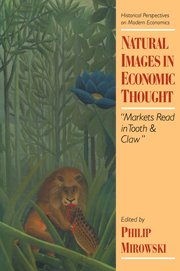Book contents
- Frontmatter
- Contents
- List of contributors
- Acknowledgments
- Part I The Natural and the Social
- 1 Doing what comes naturally: four metanarratives on what metaphors are for
- 2 So what's an economic metaphor?
- Part II Physical metaphors and mathematical formalization
- Part III Uneasy boundaries between man and machine
- Part IV Organic metaphors and their stimuli
- Part V Negotiating over Nature
- Index
2 - So what's an economic metaphor?
Published online by Cambridge University Press: 19 January 2010
- Frontmatter
- Contents
- List of contributors
- Acknowledgments
- Part I The Natural and the Social
- 1 Doing what comes naturally: four metanarratives on what metaphors are for
- 2 So what's an economic metaphor?
- Part II Physical metaphors and mathematical formalization
- Part III Uneasy boundaries between man and machine
- Part IV Organic metaphors and their stimuli
- Part V Negotiating over Nature
- Index
Summary
Knowing is nothing but working with one's favorite metaphors.
Friedrich NietzscheIndeed, as the documents of science pile up, are we not coming to see that whole works of scientific research, even entire schools, are hardly more than the patient repetition, in all its ramifications, of a fertile metaphor?
Kenneth BurkeUntil 1983, when Donald McCloskey invited literary criticism to the table of economics, the very notion of metaphor was virtually absent from economic discourse. Arguing in “The Rhetoric of Economics,” McCloskey proposed taking metaphor seriously. Since his article appeared in the Journal of Economic Literature, metaphor has acquired some currency among economists; its mention is no longer a show-stopping non sequitur.
The currency of the term “metaphor” does not, however, imply a general acceptance of its importance. On the contrary, suspicion and indifference still rule the day, if we may speak metaphorically. The average economist would be unable to locate “metaphor” in the economic lexicon. Many of our colleagues will grant the existence of metaphor, perhaps even conceding its ubiquity, but they then rejoin with the debater's bogey – “So what?”
The suspicion rests, we surmise, on the impression that metaphors introduce ambiguity. The imprecision created by ambiguous meaning is presumably fine for poets, but anathema for scientists. When McCloskey equates economics with poetry because it too relies on metaphors, scientifically minded economists are offended. “What matters is that we, as scientists, write down in a precise way what we mean. Precision is one of the standards by which we measure science.
- Type
- Chapter
- Information
- Natural Images in Economic ThoughtMarkets Read in Tooth and Claw, pp. 20 - 52Publisher: Cambridge University PressPrint publication year: 1994
Accessibility information
- 98
- Cited by

